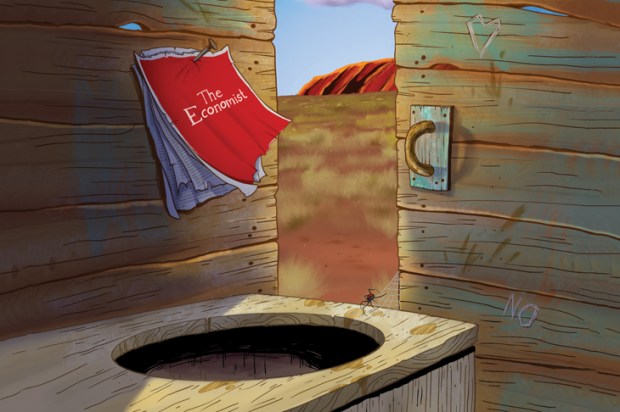Just as the race rights push reaches its zenith in Australia, with the Voice campaign, so it is ebbing in the US, where it launched in 1978 with a Supreme Court decision, and where a June 2023 Supreme Court decision is waving it goodbye. This decision feels historic, symbolic. Australia is sometimes advantaged by being on the edge of empire, and a late adopter of trends – this is one of those times.
Affirmative action laws have always been bollocks, no matter how well dressed up they are in the language of rectifying injustice and righting past wrongs. Birthright privilege has been rejected in the West for centuries – remember aristocracy and the divine right of kings? The left is now trying to restore it under the guise of the Diversity, Equity and Inclusion (DEI) label, because their preferred groups will benefit, but it remains race determinism, as Justice Clarence Thomas opined. And profoundly unfair. When the US Supreme Court finally overturned the concept of race-based admissions to higher education, it made illegal what has long been unpopular. Even leftist California voted against affirmative action (AA) in 2020. This race-privilege fight is not over, but the pendulum has started to swing away from identity politics.
In part this is because it is glaringly obvious that AA doesn’t work. It has not enabled blacks to scale the ladder of disadvantage, as other groups have. A New York Times analysis found fewer blacks and Hispanics were at college in 2017 than before AA. Commentator Ayaan Hirsi Ali writes that only 43 per cent of blacks who win college entry graduate in six years, well below the 63 per cent national average. And black graduates make up as much as the bottom 20 to 25 per cent of their law classes. Pity the poor underprepared and likely less capable black students outclassed and out-competed in lessons; cue the student derision. Moreover, many Ivy League black entrants come from the offspring of foreign black elites, not the poor black kid from the Bronx. New and belittling words have entered the language – ‘diversity hire’, ‘token female’ and so on. I remember in 2016 reading the Wikileaks emails of then-Democrat campaign boss John Podesta, and finding a template for a proposed committee; no names were pencilled in, just identities: Black, Disabled, Hispanic, Female, and so on. But identity, like skin colour, is no magic wand for wisdom or efficiency, as Kamala Harris and White House press spokesman Karine Jean-Pierre, both diversity hires, demonstrate daily.
One aspect of AA that has been little discussed, in part because it is litigious ground, is the incompetence it ushers in. Prioritising diversity inevitably downgrades merit. The doomed Titan submersible typified this approach, with the boss Stockton Rush preferring ‘inspiring’ youngsters to competent ex-military white 50-year-olds, and he’s paid the ultimate price. None of us will ever forget the human figures tumbling off the last US flight out of Kabul after the bungled and disastrous American withdrawal. Similar disdain for both merit and reality can be seen in the global renewables debate, where the Chris Bowens of the world pretend ‘green sustainable’ energy can replace baseload power, without ever showing how the two ends meet. The arrogance of this approach, which assumes that the lights will stay on even if engineers and power grid realists say they will not, is a symptom of Western decline. We are no longer doing the hard yards that made the Judeo-Christian West the dominant global civilisation, and we are pretending we don’t have to. Reality is not as important as our pet projects these days. Until, as with the Titan submersible, it is.
US investment analyst Harold Robertson recently wrote an eye-opening expose in Palladium magazine – ‘Complex Systems won’t survive the Competence Crisis’ – on the incompetence and looming failure he sees around him. He referenced the East Palestine train derailment, the deaths of 17 in three US naval collisions in 2017 alone, air traffic control failures such as nine near-misses at US airports in the first three months of 2023, Boeing 737 safety issues and more as evidence that America’s complex systems, absent competence, are slowly collapsing. ‘The core issue is that changing political mores have established the systematic promotion of the unqualified and sidelining of the competent.’
Robertson expertly describes how DEI white-ants organisations, including by demoralising the capable and promoting the incompetent, and argues ‘catastrophic normal accidents will happen with increasing regularity…. While each failure is officially seen as a separate issue to be fixed with small patches, the reality is that the whole system is seeing failures at an accelerating rate, which will lead in turn to the failure of other systems. The more recent coronavirus pandemic was another teachable moment. What started just three years ago with a novel respiratory virus has caused a financial crisis, a bubble, soaring inflation, and now a banking crisis in rapid succession.’
Equally, as merit has receded, practical skills no longer command the respect they once did. Our schools now spend valuable curriculum time on climate change and feminism, sexual issues and activism, rather than prioritising the three Rs. This is all part of the same contempt for reality and practicality in favour of ideological correctness. Once upon a time, schools taught some life skills, along with the three Rs.
My small country high school taught cooking and sewing in home economics; there was woodwork and metalwork for boys. Now I find that young women of my acquaintance, for example, have only a dinner plate idea of where cuts of meat come from in an animal. By contrast, my high school learning, while better, was no match for that of my paternal grandmother, a bushie, who was locally famed for her ability to turn a pig into brawn, sausages, and all the different cuts. Skills matter, competence matters.
This point was beautifully made in the recent movie Triangle of Sadness, which told of an African luxury cruise for the ridiculously wealthy. When pirates attack, the ship is blown up, and, spoiler alert, the survivors wash up on a nearby island. There, only one person, a cleaner, knows how to fish without tackle or tools. As the sole food provider she becomes the boss, upending the old hierarchy, taking a young male model as a toy boy, and claiming the best sleeping spot. Skills matter, competence matters, and skin colour is neither here nor there.
Got something to add? Join the discussion and comment below.
You might disagree with half of it, but you’ll enjoy reading all of it. Try your first month for free, then just $2 a week for the remainder of your first year.













